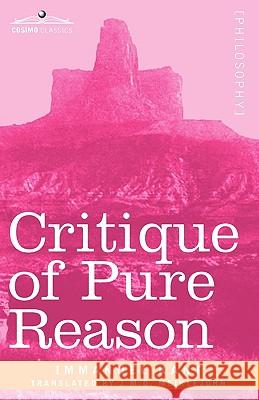Critique of Pure Reason » książka
Critique of Pure Reason
ISBN-13: 9781605204499 / Angielski / Miękka / 2009 / 504 str.
Critique of Pure Reason
ISBN-13: 9781605204499 / Angielski / Miękka / 2009 / 504 str.
(netto: 101,32 VAT: 5%)
Najniższa cena z 30 dni: 106,09
ok. 16-18 dni roboczych
Dostawa w 2026 r.
Darmowa dostawa!
Often called Kant's "first critique," this is a foundational work of modern philosophy, one that attempts to define the very nature of reason, and to join the two schools of thought dominant in the late 18th century: that of Empiricism and Rationalism. At the border between thinking subject to religion and realities as the burgeoning sciences were demonstrating at the time, Kant explores ethics, the limits of human knowledge, logic, deduction, observation, and intuition, and in the process laid the groundwork for the modern intellect. First published in 1781, this is required reading for anyone wishing to be considerd well educated. German metaphysician IMMANUEL KANT (1724-1804) served as a librarian of the Royal Library, a prestigious government position, and as a professor at Konigsberg University. His other works include Observations on the Feeling of the Beautiful and Sublime (1764), Groundwork of the Metaphysics of Morals (1785), and Critique of Practical Reason (1788)."
Often called Kants "first critique," this is a foundational work of modern philosophy, one that attempts to define the very nature of reason, and to join the two schools of thought dominant in the late 18th century: that of Empiricism and Rationalism.At the border between thinking subject to religion and realities as the burgeoning sciences were demonstrating at the time, Kant explores ethics, the limits of human knowledge, logic, deduction, observation, and intuition, and in the process laid the groundwork for the modern intellect.First published in 1781, this is required reading for anyone wishing to be considerd well educated.German metaphysician IMMANUEL KANT (1724-1804) served as a librarian of the Royal Library, a prestigious government position, and as a professor at Königsberg University. His other works include Observations on the Feeling of the Beautiful and Sublime (1764), Groundwork of the Metaphysics of Morals (1785), and Critique of Practical Reason (1788).











